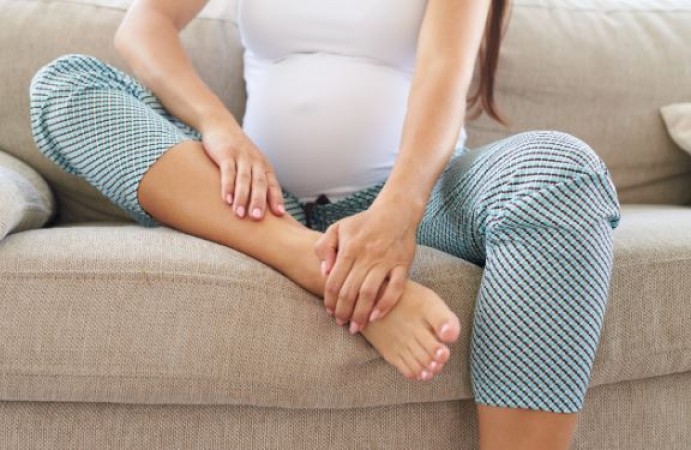
Pregnancy is a beautiful journey filled with anticipation and joy, but it also comes with its fair share of challenges. One common discomfort experienced by many expectant mothers is swollen feet, also known as edema. Swelling in the feet and ankles during pregnancy is a common occurrence due to hormonal changes, increased blood volume, and the pressure of the growing uterus on blood vessels. While it can be uncomfortable, there are several effective remedies and tips that can help manage swollen feet during this special time.
Understanding Swollen Feet During Pregnancy
Swelling in the feet and ankles is a natural response during pregnancy due to a combination of factors. The body retains more water during pregnancy to support the growing fetus, and hormonal changes can lead to increased fluid retention. Additionally, the pressure exerted by the expanding uterus on blood vessels, particularly those returning blood from the lower body, can contribute to fluid accumulation in the feet.
Remedies for Managing Swollen Feet
Stay Hydrated: It might seem counterintuitive, but staying properly hydrated can actually help reduce swelling. When the body is well-hydrated, it's less likely to hold onto excess water. Aim to drink plenty of water throughout the day, but avoid excessive fluid intake before bedtime to prevent nighttime trips to the bathroom.
Elevate Your Feet: Elevating your feet whenever possible can help reduce swelling. When you elevate your feet above heart level, it encourages the excess fluid to move away from the lower extremities and towards the upper body, where it can be more effectively eliminated by the kidneys.
Regular Exercise: Gentle exercise, such as walking or prenatal yoga, can improve circulation and prevent fluid buildup. However, avoid standing or sitting for prolonged periods, as this can worsen swelling. Consult your healthcare provider before starting any new exercise routine during pregnancy.
Compression Stockings: Graduated compression stockings can provide gentle pressure to help prevent fluid from accumulating in the lower legs. These stockings are designed to be tighter around the ankles and gradually looser as they go up the leg, aiding in blood circulation.
Healthy Diet: A well-balanced diet rich in fruits, vegetables, lean proteins, and whole grains can help regulate fluid balance. Foods high in sodium can contribute to water retention, so try to reduce your salt intake. Including foods with natural diuretic properties, such as watermelon, cucumber, and lemon, can also be beneficial.
Foot Soaks: Soaking your feet in cool water can provide relief from swelling. You can add a few drops of essential oils like lavender or peppermint to the water for a soothing effect. Make sure the water is not too cold, as extreme temperatures can have adverse effects.
Massage: Gentle foot and leg massages can improve blood circulation and help reduce swelling. Use a moisturizing lotion or oil to prevent friction and make the massage more comfortable.
Avoid Tight Clothing: Wearing tight shoes, socks, or clothing that restricts circulation can worsen swelling. Opt for comfortable, supportive shoes with wide toe boxes that allow your feet room to breathe and move.
Sleep on Your Side: As your pregnancy progresses, sleeping on your left side is recommended. This position improves blood flow to the placenta and can also help reduce pressure on major blood vessels, potentially minimizing swelling.
Reduce Salt Intake: Sodium can contribute to water retention, so try to limit your intake of salty foods. Read food labels to identify hidden sources of sodium, and choose fresh, whole foods whenever possible.
Cool Compresses: Applying cool, damp cloths or gel packs to your feet and ankles can provide instant relief from swelling. Make sure the compress is not too cold, as extreme cold can cause discomfort.
Avoid Crossing Legs: Crossing your legs while sitting can impede blood circulation and exacerbate swelling. Instead, try to elevate your legs or prop them up on a footstool to encourage proper blood flow.
When to Consult a Healthcare Provider
While mild swelling is normal during pregnancy, it's essential to be aware of signs that may indicate a more serious condition, such as preeclampsia. If you experience sudden and severe swelling, especially in the hands and face, along with other symptoms like high blood pressure, headaches, or changes in vision, it's crucial to contact your healthcare provider immediately.
Swollen feet during pregnancy can be uncomfortable, but with the right remedies and lifestyle adjustments, you can effectively manage this common issue. Remember that every pregnancy is unique, so it's essential to listen to your body and consult your healthcare provider before making any significant changes to your routine. By staying hydrated, engaging in regular exercise, and practicing self-care techniques like elevating your feet and gentle massages, you can ease the discomfort of swollen feet and focus on enjoying the miraculous journey of pregnancy.
Heart Attack or Panic Attack, Which is More Dangerous?